It’s been a big summer for South and Southeast Asia when it comes to LGBT and queer news. There were pride parades, lesbian couples eloping left and right, and a whole lot of backlash — but also some hope. The most important aspect of this news, however, is that it was reported at all. Historically, many South and Southeast Asian countries have maintained silence on queer issues. These incidents were reported not only by Western media, but also by local media in the countries.
In India, two female college students eloped at the end of July in the state of Kerala. One of the fathers filed a police complaint, saying that his daughter was kidnapped by a lesbian with the help of Sangama, a Bangalore-based LGBT rights organization. However, police stopped investigations after the two women released statements saying they are both over the age of consent. The father has now filed a habeas corpus with the Kerala high court.
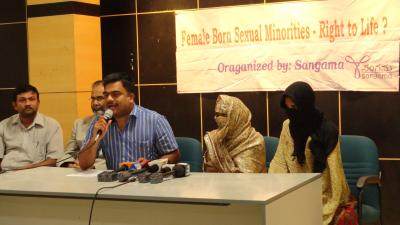
via Gay Star News
Earlier this year, Rizwana Ansari and Renuka Sisodia eloped and married outside of Bhopal. Again, the parents filed a police complaint, though they originally suspected that a man had eloped with Rizwana.
In Bangladesh, another female couple eloped and married in what is reportedly the first same-sex Bangladeshi marriage. Both 21-year-old Mosammat Sanjida Akte and her 16-year-old wife attended Pirojpur Government Suhrawardy College. They married in a Hindu ceremony in the capital city of Dhaka with the help of an NGO worker. After one of the fathers filed a missing persons report, police found the couple living together in a rental home in Dhaka. The younger woman was returned to her family, and Sanjida is in police custody in Pirojpur, facing charges of abduction and trafficking. If cited for homosexuality, she could face life in prison or up to ten years of hard labor.
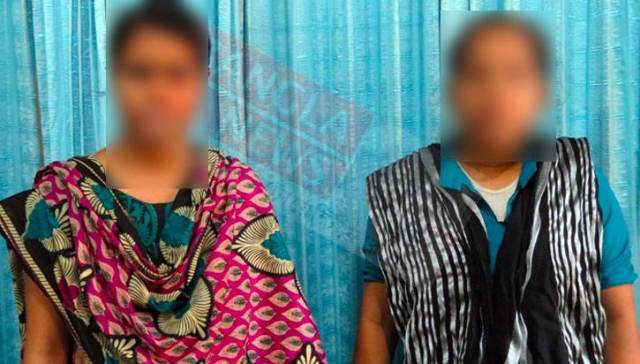
via Gay Star News
South Asian cultures have a long history of arranged marriage. Women, considered extensions of a family’s honor, were (and often still are) expected to stay chaste until marriage, and defer the decision of a life partner to their families. Of course, for some South Asians this is changing, but these changes are slow to work their way into non-urban areas.
In 2009 and again in 2013, Bangladesh was under Universal Periodic Review (UPR) by the United Nations Human Rights Council (UNHRC). In 2009, the UPR recommended that Bangladesh decriminalize homosexuality under Section 377, and that the government educate law enforcement and judicial officers about sexual and gender minorities to mitigate abuse and maltreatment of LGBTQ peoples. The Bangladesh government consented to the latter, but rejected the former recommendation. Homosexuality is still criminalized in the country.
Most of South Asia remains hostile to LGBT people, and same-sex relationships are often stigmatized, if not outright outlawed. After being put into effect by the British Raj, Section 377, which criminalizes “unnatural” sex, still holds sway in the penal codes of many former British colonies, including Bangladesh. Nepal decriminalized homosexuality in 2007, and is legally the most LGBT-friendly South Asian country with anti-discrimination laws and ID cards that allow a “third gender” option. In a landmark decision in 2009, the India High Court decriminalized homosexuality, becoming the second South Asian country to do so.
Though same-sex relationships continue to face social stigma, India continues to hold annual queer pride parades. There was even one in Bangalore in December, which was covered by The Hindustan Times, a major Indian newspaper.
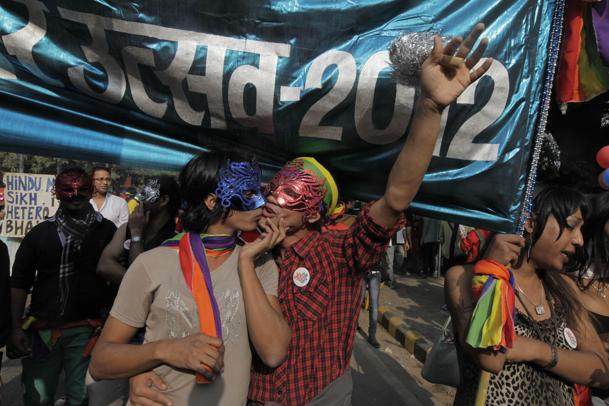
via Boston Globe
Speaking of pride parades and glitter, Vietnam held its second LGBT pride parade this weekend. Decked out in rainbows, two hundred paraders biked through Hanoi. Although they didn’t have official governmental permission, police did not stop them. For a communist country that tightly controls all public demonstrations, the tacit permission holds a lot of significance. Even though the country’s state-run newspaper proposed the criminalization of homosexuality in 2002, Vietnam is now considering legalizing same-sex marriage.
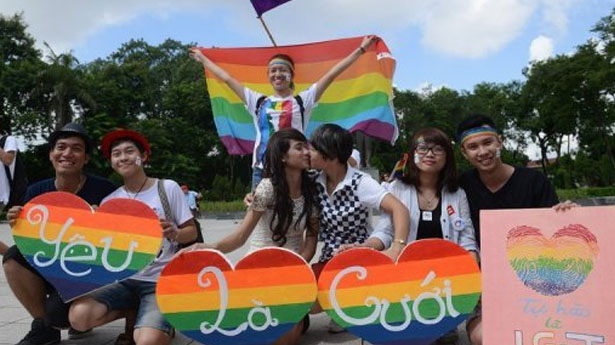
via Raw Story
Other parts of Southeast Asia are also facing a shift in the cultural landscape in terms of queer visibility. In June, 21,000 LGBT people and straight allies in Singapore got together for the Pink Dot, or Freedom to Love, campaign. The government kept silent, but like in Vietnam, the event was not stopped, nor was it officially condoned.
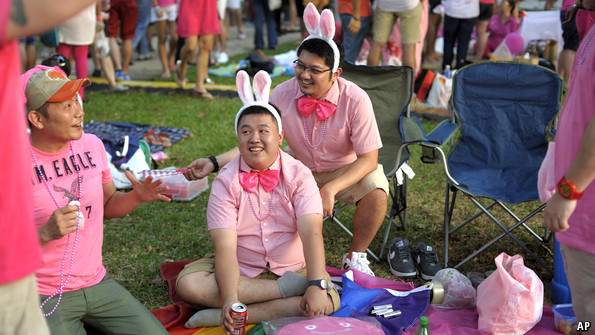
via The Economist
So far in Southeast Asia, homosexuality is officially legal in Cambodia, East Timor, Indonesia, Laos, Thailand and Vietnam. Same-sex adoption is legal in Cambodia and the Philippines. Like South Asia, in most Southeast Asian countries homosexual behavior is highly stigmatized, and same-sex marriage rights may be a ways away.
For those who live in the U.S., Canada or any other place called The West, it’s increasingly easy to equate LGBTQ rights with marriage, adoption and associated legal rights. As queer rights in Western nations become more and more about legal reform, we shouldn’t lose sight of the larger cultural shifts starting to take place in countries around the world. (This is not to discount countries like Thailand, which have been on the forefront of queer acceptance for a long time.) While legal reform is important, countries like India, Bangladesh and Vietnam are experiencing an even more important sociocultural shift that has the potential to better the lives of their queer citizens, even if it’s harder to measure quantitatively.
LGBTQ issues are gaining increased visibility in the media, both globally and in these specific countries. Stories of struggle and celebration are now covered by official and unofficial media around the world, driving and reflecting a sociocultural shift toward queer visibility. Greater visibility means less isolation and more connection with the global queer community.
Perhaps what’s most notable about the growing visibility of queerness in South and Southeast Asia is that it’s not negative. Police didn’t break up pride celebrations in Vietnam and Singapore. Local news coverage of India’s pride parades, and the coverage of lesbian weddings, is largely neutral. For countries with long histories of homophobia (largely due to colonialism, although that’s a longer article), neutral news coverage could actually signal a cultural shift. Still, much of our queer family faces very real danger, including but not limited to incarceration.
While those in the West may take things like pride parades for granted, we mustn’t forget that forms of queerness are still criminalized and stigmatized in many parts of the world. Queer people are often still seen as social plagues, and our collective struggle needs to involve global consciousness and awareness.



OMG!!! As a Canadian-born Khmer currently living in Cambodia, this article is HIGHLY relevant to my interest!
Thank you so much for writing this, I am bookmarking this.
OK so my reply was written quickly just as I was about to go out.
Basically, in my time here, I have met one local lesbian who is a tomboy and we had a long conversation as to why it is so hard for expats to find themselves a local queer community in places like Cambodia. Mainly, it’s all about the culture difference; consdering how “new” it is to them to be out-ish, it’s extremely overwhelming to them how open expats are with their sexuality. Not to mention how structured their days are, meaning because most of them are NGO workers or employees for international companies, they have a specific time to work, specific time to eat, specific time to go out and hang out, whereas Khmers do all of that whenever they want, however they want. And many go home to their families by 8PM and don’t go out the way some of us do, getting home at 5AM after a night of heavy drinking and dancing. The locals who do go out like I.. we do, tend to fall into the alcoholic and/or drug addict categories. So it all comes down to culture and lifestyle differences.
The best way to break the barrier is opening a conversation between the two groups, but there is still a big language barrier. They’re out there, but they feel more comfortable being amongst themselves which is understandable. It will take time.
As someone from that region, I’d just like to point out the significant difference between our countries and Western regions. Legal reform would be fantastic, but so many other deeply entrenched cultural issues have so much more of a major hold over me (us? I hesitate to speak for everyone of the same racial/cultural/etc background as myself). Even if gay marriage were legalised, or homosexuality decriminalised, that means almost nothing to me if a large majority of the culture I’m a part of still regards homosexuality as something shameful/embarrassing/reflective of a parent’s parental skill (or lack thereof).
Of course, it may be generational; those of my parents generation tend to strongly regard homosexuality/anything queer as deviant and unacceptable, I think. But some of it carries through to their children too. I personally think it’s because we (generally) have a strong traditional …mindset (?) and it leans towards highly conservative. I feel like, compared to the West, where being liberal is seen to be better than being conservative, at least in more recent times, in Southeast Asia, conservative is still better/more respectable/accepted.
Basically, life still sucks a little bit, it’s nice to see things about gay marriage but it’s not in countries where my nationality says I am supposed to belong, and I get very confused and wordy about how I feel about these things sometimes.
Yes! Legal reform is only a step, though an important one. While there is something to be said for official legal protection and decriminalization, the most important result of greater queer visibility (in my opinion) is that culture starts to slowly change. Slowly. Sometimes too slowly. What I’m hoping for is that with decriminalization and greater visibility comes a willingness to engage with the issues in popular media (movies, literature, TV, music) in a positive way that then has an impact on the next generation’s values. But you’re right. Legal reform is often seen as an end-all, be-all in Western gay rights efforts, and that’s simply not true. Legal reform has to go hand in hand with a major cultural shift toward acceptance in order to make a real impact on people’s lives.
I’m personally most excited about seeing/participating in activism that isn’t centred on moving along some scale of legal/political recognition (e.g. decriminalisation –> anti-discrimination –> equal marriage, to paint the path very, very broadly), not just because of cultural differences as you pointed out but also because of how governments here operate differently and how people relate to them differently. I’m from Singapore, and the way politics operates here is… unique, to say the least, so it’s fascinating to me to see how civil society evolves in different political contexts. (Though I also know Singapore is the country most likely in the region to try to emulate US/UK/etc. activism, so.)
I’m an American who is about to leave for a four-month stay in Delhi. In America I’m used to being able to be very out and all the advantages that come with that. In particular, having a lot of queer friends who I can talk about queer experience with. One of the things I was nervous about was feeling alone for the next four months. Thank you so much for writing something about queer visibility in South Asia! Also, if anyone has advice or information about being a queer woman in Delhi I would love to hear about it.
I would get in touch with queer organizations in Delhi before you leave, just so you have an in-person support network. I’d also make sure to figure out wifi/internet situations when you get there, so that you have queer friends online to talk to. I know, basic stuff, but it bears repetition.
And be warned: it’s dangerous to be out. While white privilege (I don’t want to assume you’re white, but going by your picture, I can assume you will pass for white in India and have white privilege while there) can protect you, make sure to take precautions. Delhi can be a wonderful place to visit and stay, and while there have been a ton of changes and progress in terms of social justice and queer tolerance, I’d still be careful and aware of my surroundings. Not to be gloom and doom. If you keep your wits about you, you’ll be just fine.
You may already know about these but in case:
http://www.gaytravel.com/new-delhi/gay-scene
https://www.facebook.com/pages/LGBT-Delhi/100819333321526
http://qashtilbtindia.wordpress.com/
EEE. I’m Malaysian; my parents are Bangladeshi. It’s like queer Eid all over Autostraddle this week :D :D :D
As someone who has studied india in post-grad. I guess I don’t really get how sexuality comes into it with arranged marriages. Cos it doesn’t matter if you like them (esp. as a woman) its about arranged marriages and things.
People (esp.) women don’t get to go with their fantasy cos your family decides, so why would sexuality be important in Indian culture.
I’m not being not genuine, I just don’t really get it.
Not everyone in India gets an arranged marriage. And when they do, much of the time the family does want the bride and groom to be happy. Many women have a say in the decision. Obviously, there are many cases when they don’t, especially in the disadvantaged, more rural, underdeveloped areas of India.
India is such a smorgasbord of political leanings, religions, languages and cultures that in many areas, men and women have choices in who they marry, even if the marriage is arranged. In more urban areas, queer visibility is actively developing against the norm of the hetero (arranged or not) marriage option.
Let’s also not forget that most countries in South Asia engage in arranged marriages. Not just India, but also Sri Lanka, Nepal, Pakistan, Bangladesh, etc.
Thank you for this article!!! I live in eastern Asia, but Asia as a whole gets largely ignored when it comes to discussions about advancements in queer rights. .. The focus tends to be on the progress in the Americas and Europe.. Sometimes it feels like nothing is happening here, because the media barely talks about it at all. In that way I feel like @Jean815 and @SJ Sindu really have a point about the need for focusing on cultural shifts towards equality. The gays need to be more visibly and openly active in the media and arts..
Anyway yes, Pink Dot, y’all: they’ve started doing them in other countries too, like in Okinawa, Japan, etc. very excited…. I just might go next year!
Placement consultants make the hiring process more efficient and enhance the prospects of job seekers.
Placement consultants analyze candidates’ skills and preferences and then match them with suitable roles from their network of employers.